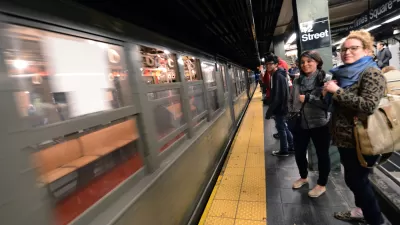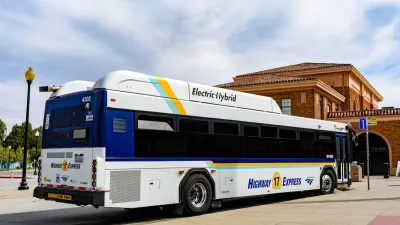Have a long commute? If so, you are likely not very engaged in politics with one major exception - higher incomes can counter commuting stress. But for the rest of us, it may explain why we aren't as involved in civic issues we would like.
NPR's Morning Edition host, Steve Inskeep, engages in a discussion with NPR's social science correspondent, Shankar Vedantam about how the length of our trip to work "may be partly to blame for widespread political disengagement among many Americans." Media tape and MP3 available as well as transcript.
Vedantam spoke with researchers from Stony Brook University and University of Connecticut who "found that the length of your commute seems to shape your political engagement." Inskeep ask if it's it just a matter of the increased length of time spent commuting.
VEDANTAM: You know, for many years political scientists thought that was the case, Steve, but it turns out that actually isn't the case, because the more time people spend at work, for example, is not connected with lower political engagement. So the amount of time you're involved with different activities does not necessarily affect political engagement.
Anyone who has spent long hours on the road or perhaps in a noisy, crowded rail car or bus might relate to what makes the commuting different from other activities.
There's something about commuting in particular that seems to affect engagement, and the researchers are drawing here on this paper on earlier work by the behavioral economist Daniel Kahneman. He's found that commuting ranks among the most unpleasant parts of people's day. There's something uniquely stressful about commuting, and so when you get home after a hellacious day, you really have nothing to give to other people in terms of civic engagement, in terms of getting involved in your neighborhood politics.
And the exception to the rule:
Vedantum explains that "as we go up the income ladder, the effects that commuting have on political engagement actually decrease until we get to the very wealthy, where the longer your commute, the more likely you are to be politically engaged."
Also in Tuesday's Morning Edition, host Renee Montagne joins a carpool in Los Angeles to explore what accounts for how 10 percent of Americans get to work as part of their Commuting in America series.
Perhaps those stressed solo commuters who aren't earning six figures might enjoy this alternative - it can reduce stress levels, as the joking among the riders captured in the above story illustrate. Transit professionals agree.
Ride-sharing "a lot of times is a response to higher gas prices," says Eddie Caine, who heads the van pool program for Valley Metro, Phoenix's regional transportation agency. "But once people try van pooling, they tend to enjoy not having the stress, saving money and they make friends." ["Fewer Americans commuting solo", USA Today, 9/20/2012]
FULL STORY: Study: Commuting Adversely Effects Political Engagement

Planetizen Federal Action Tracker
A weekly monitor of how Trump’s orders and actions are impacting planners and planning in America.

Map: Where Senate Republicans Want to Sell Your Public Lands
For public land advocates, the Senate Republicans’ proposal to sell millions of acres of public land in the West is “the biggest fight of their careers.”

Restaurant Patios Were a Pandemic Win — Why Were They so Hard to Keep?
Social distancing requirements and changes in travel patterns prompted cities to pilot new uses for street and sidewalk space. Then it got complicated.

Platform Pilsner: Vancouver Transit Agency Releases... a Beer?
TransLink will receive a portion of every sale of the four-pack.

Toronto Weighs Cheaper Transit, Parking Hikes for Major Events
Special event rates would take effect during large festivals, sports games and concerts to ‘discourage driving, manage congestion and free up space for transit.”

Berlin to Consider Car-Free Zone Larger Than Manhattan
The area bound by the 22-mile Ringbahn would still allow 12 uses of a private automobile per year per person, and several other exemptions.
Urban Design for Planners 1: Software Tools
This six-course series explores essential urban design concepts using open source software and equips planners with the tools they need to participate fully in the urban design process.
Planning for Universal Design
Learn the tools for implementing Universal Design in planning regulations.
Heyer Gruel & Associates PA
JM Goldson LLC
Custer County Colorado
City of Camden Redevelopment Agency
City of Astoria
Transportation Research & Education Center (TREC) at Portland State University
Camden Redevelopment Agency
City of Claremont
Municipality of Princeton (NJ)




























